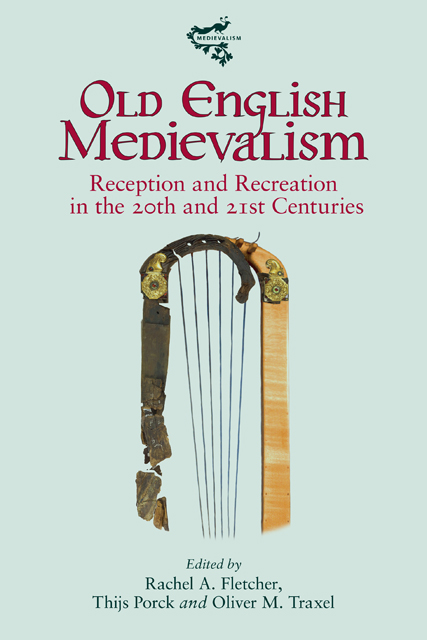Book contents
- Frontmatter
- Contents
- List of Illustrations
- List of Contributors
- Acknowledgements
- List of Abbreviations
- Early Medieval English in the Modern Age: An Introduction to Old English Medievalism
- I Reinventing, Reimagining and Recontextualizing Old English Poetry
- II Invoking Early Medieval England and Its Language in Historical Fiction
- III Translating and Composing in Neo-Old English
- IV Approaching Old English and Neo-Old English in the Classroom
- Bibliography
- Index
- Medievalism
7 - Reimagining Early Medieval Britain: The Language of Spirituality
Published online by Cambridge University Press: 17 December 2022
- Frontmatter
- Contents
- List of Illustrations
- List of Contributors
- Acknowledgements
- List of Abbreviations
- Early Medieval English in the Modern Age: An Introduction to Old English Medievalism
- I Reinventing, Reimagining and Recontextualizing Old English Poetry
- II Invoking Early Medieval England and Its Language in Historical Fiction
- III Translating and Composing in Neo-Old English
- IV Approaching Old English and Neo-Old English in the Classroom
- Bibliography
- Index
- Medievalism
Summary
The study of early medieval Britain is at a critical juncture not only for redefining the field but also for (re-)presenting it to the general reader of historical fiction. Scholars who study what has commonly been known by the shorthand ‘Anglo-Saxon England’ continue to confront modern fallacies about the ‘dark ages’ and, curiously, its imagined ‘whiteness’. On both the scholarly and the popular fronts, the medieval–modern divide needs breaking down, particularly around issues of race, class, and gender, but also around the binary of religious versus secular, dividing soul and body, heaven from earth. Language, medieval and modern, is deeply implicated in all of these constructions and representations.
This chapter examines the role of historical fiction in both reinforcing and challenging popular misconceptions of early medieval Britain while reviving a more holistic sense of the human condition. These reflections draw on the author’s experiences as a historian of early medieval Europe and pre-modern world history, as a reader of historical fiction and fantasy, and as a long-time resident among the Indigenous people of Hawai‘i (Kānaka). These scholarly and personal experiences inform an ongoing project of writing historical fiction set in tenth-century Northumbria.
Theoretical frameworks for understanding the language of early medieval spirituality incorporated in this chapter include post-colonial Indigenous studies and post-secular theologies. The aim is to find ways to recover the spirituality of an early medieval Britain that was transcultural and translingual, in part by considering various Englishes then and now. The author uses historical fiction to explore bilingual texts and translingual cultural environments that decentre standard West Saxon in favour of various Englishes, plural. Anecdotal examples range from language play in J. R. R. Tolkien, Paul Kingsnorth, and Umberto Eco to excerpts from draft chapters of the author’s novel.
This novel is a fictional biography of Aldred, a tenth-century Northumbrian scribe, bilingual Latin–English glossator of the Lindisfarne Gospels, and provost of St Cuthbert’s community at Chester-le-Street. Draft chapters of the novel endeavour to recreate Christian spirituality in the translingual environment of tenth-century ‘Britain’, to use the geographic insular term instead of England, since the latter is a contested political construct that emerged only in the mid-tenth century.
- Type
- Chapter
- Information
- Old English MedievalismReception and Recreation in the 20th and 21st Centuries, pp. 135 - 154Publisher: Boydell & BrewerPrint publication year: 2022



